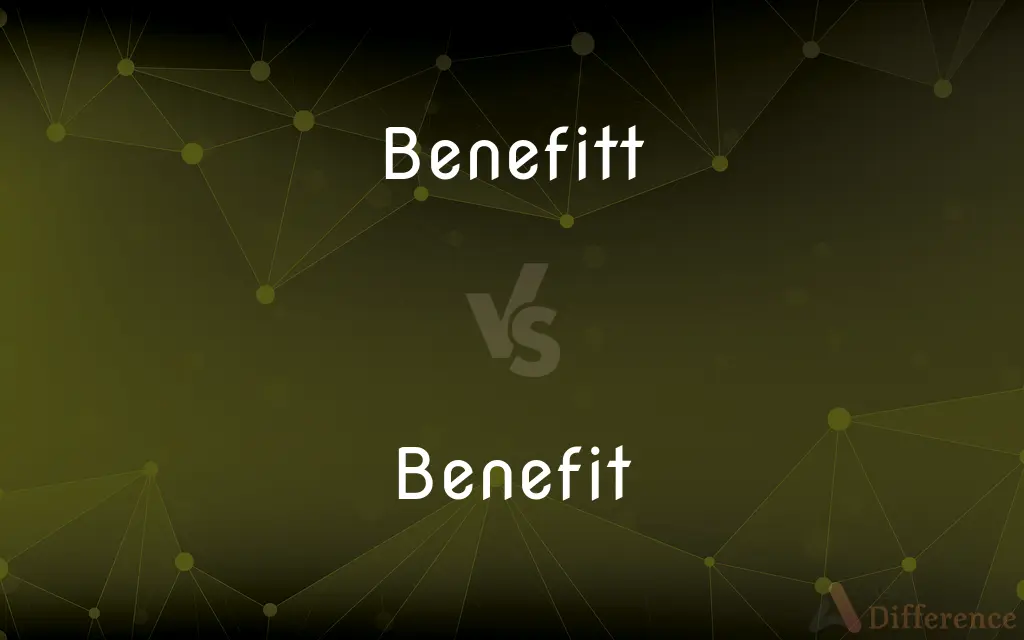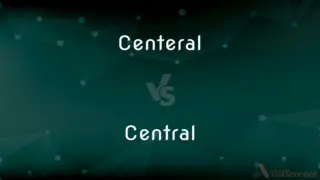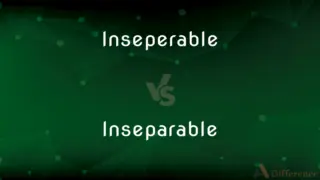Benefitt vs. Benefit — Which is Correct Spelling?
Edited by Tayyaba Rehman — By Fiza Rafique — Updated on April 2, 2024
"Benefitt" is incorrect, while "Benefit" is the accurate spelling, referring to an advantage or profit gained from something.

Table of Contents
Which is correct: Benefitt or Benefit
How to spell Benefit?

Benefitt
Incorrect Spelling

Benefit
Correct Spelling
ADVERTISEMENT
Key Differences
Fit not Fitt: You benefit from being "fit", not "fitt".
Beneficial One T: Recall “beneficial” has one "t"; drop the "cial" to remember "benefit".
Think of “Fit”: “Benefit” helps you stay fit with one "t".
One “t” Triumph: Remember that “benefit” triumphs with just one "t".
Gift, not Gifft: Like "gift" has one "t", so does "benefit".
ADVERTISEMENT
How Do You Spell Benefit Correctly?
Incorrect: He did not receive the full benefitt of the insurance payout.
Correct: He did not receive the full benefit of the insurance payout.
Incorrect: She explained the benefitt of regular exercise.
Correct: She explained the benefit of regular exercise.
Incorrect: One major benefitt of reading is improving your vocabulary.
Correct: One major benefit of reading is improving your vocabulary.
Benefit Definitions
Benefit refers to an advantage or something that promotes well-being;
The health benefits of exercise are well-known.
A benefit can be an event aimed at raising funds for a charitable purpose;
The concert is a benefit for disaster victims.
An advantage or profit gained from something
Enjoy the benefits of being a member
The changes are of benefit to commerce
A payment made by the state or an insurance scheme to someone entitled to receive it
Part-time jobs supplemented by means-tested benefits
Families on benefit
An event such as a concert or game that is intended to raise money for a particular player or charity
A benefit gig
The social season was highlighted by debutante balls and charity benefits
Receive an advantage; profit
The areas would benefit from regeneration
Something that promotes or enhances well-being; an advantage
The nurse explained the benefits of regular exercise.
Help; aid
The field trip was of great benefit to the students.
A payment made by a government agency or insurance company to qualifying persons in time of need
An increase in welfare benefits.
A form of compensation, such as paid vacation time, subsidized health insurance, or a pension, provided to employees in addition to wages or salary as part of an employment arrangement. Also called fringe benefit.
A public entertainment, performance, or social event held to raise funds for a person or cause.
(Archaic) A kindly deed.
To be helpful or useful to.
To derive benefit
You will benefit from her good example.
An advantage; help or aid from something.
She can't read, so the voice recording was made for her benefit.
Exposure to cutting-edge technologies is one of the benefits of the job.
(insurance) A payment made in accordance with an insurance policy or a public assistance scheme.
An event, such as a theatrical performance, given to raise funds for some cause.
(obsolete) beneficence; liberality
Intended audience (as for the benefit of).
The whole scene was staged for his benefit, and it completely fooled him.
Since my wife is Canadian, whenever we have dinner with my family, they keep bringing up anything they've heard about Canada lately for her benefit.
(transitive) To be or to provide a benefit to.
(intransitive) To receive a benefit (from); to be a beneficiary.
An act of kindness; a favor conferred.
Bless the Lord, O my soul, and forget not all his benefits.
Whatever promotes prosperity and personal happiness, or adds value to property; advantage; profit.
Men have no right to what is not for their benefit.
A theatrical performance, a concert, or the like, the proceeds of which do not go to the lessee of the theater or to the company, but to some individual actor, or to some charitable use.
Beneficence; liberality.
Natural advantages; endowments; accomplishments.
To be beneficial to; to do good to; to advantage; to advance in health or prosperity; to be useful to; to profit.
I will repent of the good, wherewith I said I would benefit them.
To gain advantage; to make improvement; to profit; as, he will benefit by the change.
Financial assistance in time of need
Something that aids or promotes well-being;
For the common good
A performance to raise money for a charitable cause
Derive a benefit from;
She profited from his vast experience
Be beneficial for;
This will do you good
A benefit can imply receiving financial assistance or profit;
He receives a benefit from the government.
Benefit represents something useful to a particular item or person;
The benefit of a good night’s sleep is paramount.
Benefit implies a positive effect resulting from a particular action or activity;
She saw no benefit in arguing.
Benefit Meaning in a Sentence
The program has been of great benefit to the community.
The benefit of early planning is less stress later on.
He volunteered for the benefit of gaining experience.
Environmental policies benefit future generations by protecting natural resources.
The benefit concert raised thousands of dollars for charity.
The project will benefit the entire neighborhood.
The policy change will benefit many people.
To benefit from the offer, customers must sign up by the end of the month.
The charity event will benefit local schools.
She donated the proceeds for the benefit of the orphanage.
Common Curiosities
What is the root word of Benefit?
The root word is the Latin "bene," meaning good.
What is the pronunciation of Benefit?
Benefit is pronounced as /ˈben.ɪ.fɪt/.
Why is it called Benefit?
The term "benefit" originates from the Latin word "beneficium," meaning a good deed or service.
Which vowel is used before Benefit?
The vowel "a" is commonly used before "benefit" (a benefit).
Which preposition is used with Benefit?
"Of" is commonly used with benefit (benefit of).
Is Benefit a negative or positive word?
Generally positive.
What is the verb form of Benefit?
"Benefit" itself can be used as a verb.
What is the singular form of Benefit?
Benefit.
What is the plural form of Benefit?
Benefits.
Which conjunction is used with Benefit?
"And" can be used (benefits and drawbacks).
Is Benefit a vowel or consonant?
Benefit is a word, not a vowel or a consonant.
Which article is used with Benefit?
"The" or "a" can be used with "benefit."
Is Benefit an adverb?
No.
Is Benefit a collective noun?
No.
Is the Benefit term a metaphor?
No.
Is the word Benefit a Gerund?
No, but "benefiting" is.
How do we divide Benefit into syllables?
Ben-e-fit.
What is the first form of Benefit?
Benefit.
Which determiner is used with Benefit?
Any relevant determiner can be used (the, a, his, etc.).
How is Benefit used in a sentence?
"The benefit of daily exercise is widely acknowledged."
Is Benefit an abstract noun?
Yes.
Is Benefit a countable noun?
Yes.
What is a stressed syllable in Benefit?
The first syllable (Ben-).
What is the opposite of Benefit?
Detriment.
What is the second form of Benefit?
Benefited or Benefitted.
What is the third form of Benefit?
Benefited or Benefitted.
Is Benefit a noun or adjective?
Benefit is primarily a noun but can also be a verb.
Is the word Benefit imperative?
No.
Is the word “Benefit” a Direct object or an Indirect object?
It can be either based on sentence construction.
How many syllables are in Benefit?
Three.
What part of speech is Benefit?
Noun and verb.
What is another term for Benefit?
Advantage.
Share Your Discovery

Previous Comparison
Centeral vs. Central
Next Comparison
Inseperable vs. InseparableAuthor Spotlight
Written by
Fiza RafiqueFiza Rafique is a skilled content writer at AskDifference.com, where she meticulously refines and enhances written pieces. Drawing from her vast editorial expertise, Fiza ensures clarity, accuracy, and precision in every article. Passionate about language, she continually seeks to elevate the quality of content for readers worldwide.
Edited by
Tayyaba RehmanTayyaba Rehman is a distinguished writer, currently serving as a primary contributor to askdifference.com. As a researcher in semantics and etymology, Tayyaba's passion for the complexity of languages and their distinctions has found a perfect home on the platform. Tayyaba delves into the intricacies of language, distinguishing between commonly confused words and phrases, thereby providing clarity for readers worldwide.













































